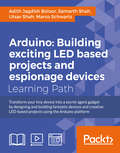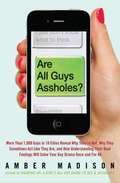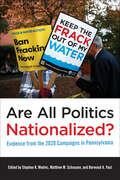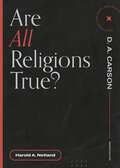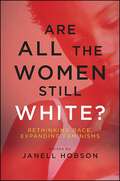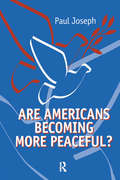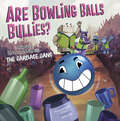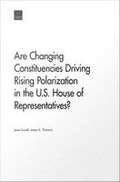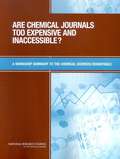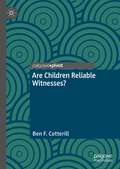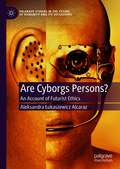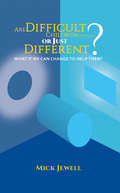- Table View
- List View
Arduino: Building exciting LED based projects and espionage devices
by Marco Schwartz Samarth Shah Utsav Shah Adith Jagdish BoloorFind out how to transform your Arduino device into an awesome secret agent gadget with this course, taking in everything from robotics to remote control cameras About This Book *This course won't just teach you. It will help you apply your knowledge so you can get creative - quickly! *Find out how to make a computer interact with the real-world - you'll be learning the basics of IoT without realizing it. *Robots. A sound controlled Christmas tree. This course proves anything is possible with an Arduino! Who This Book Is For Seeking inspiration? This course will help you get creative with your Arduino quickly. What You Will Learn *Find out how to explore the full potential of your tiny Arduino *Find out how to bridge the gap between the real world and software, as you gather and visualize data from the environment *Create simple servers to allow communication to occur *Transform your Arduino into a GPS tracker *Use the Arduino to monitor top secret data *Build a complete spy robot! In Detail An Arduino might be a tiny computer but it can be used as the foundation for a huge range of projects. In this course, we'll show you how just some of the projects that are possible with an Arduino. From robotics to secret agent gadgets, we're pretty confident that this course will get you thinking creatively - and inspire you to create your very own new projects using the Arduino hacking skills you learn. This course, combines both text and video content - it's made up of three modules to help organize your learning. In the first module we'll show you how to build three different Arduino projects. All of these will not only get you up and running with something practical, they'll also help you better understand how the Arduino works. Find out how to develop a home automation system and even build a robot! In the second module we'll go one step further to help you get creative as you learn how to program LEDs with your Arduino. You'll find out how to build a mood lamp and a remote-controlled TV backlight, before going on to make a sound controlled LED Christmas tree that makes use of sound visualization. Finally, the third module takes you from stylish design into espionage, as you learn how to create neat secret agent gadgets with your Arduino. Find out how to build an alarm system, a fingerprint sensor, even open a lock with a text message. And that's not all - but to find out more you'll have to dive in! This Learning Path combines some of the best that Packt has to offer in one complete, curated package. It includes content from the following Packt products: ? Arduino By Example by Adith Jagadish Boloor ? Arduino BLINK Blueprints by Samarth Shah, Utsav Shah ? Arduino for Secret Agents by Marco Shwartz Style and approach Combining both video and text and built from some of Packt's very best Arduino content, this course comprises of three modules covering a range of projects. It's completely focused on helping the user get creative as quickly as possible so they can explore what's possible with Arduino themselves.
Arduous Tasks
by Lina N InsanaOne of twentieth-century Italy's greatest thinkers, Primo Levi (1919-1987) started reflecting on the Holocaust almost immediately after his return home from the year he survived in Auschwitz. Levi's powerful Holocaust testimonials reveal his preoccupation with processes of translation, in the form of both embedded and book-length renderings of texts relevant to Holocaust survival. In Arduous Tasks, Lina N. Insana demonstrates how translation functions as a metaphor for the transmission of Holocaust testimony and broadens the parameters of survivor testimony. The first book to study Levi and translation, Arduous Tasks overcomes the conventional views of the separation between his own personal memoirs and his translations by stressing the centrality of translation in Levi's entire corpus. Examining not only the testimonial nature of his work, Insana also discusses the transgressive and performative aspects of transmission in his writings. Arduous Tasks is a superb and innovative study on the importance of translation not only to Levi, but also to Holocaust studies in general.
Are African Current Account Deficits Different? Stylized Facts, Transitory Shocks, and Decomposition Analysis
by Alberto Chong César Calderón Luisa ZanforlinA report from the International Monetary Fund.
Are All Guys Assholes?
by Amber MadisonWhat if everything you've been told about guys your entire life has been a lie? And what if your approach to sex, dating, and relationships is completely wrong, because it's based on false assumptions about how men think and feel? The idea that guys are "only interested in one thing," may help comedians, TV executives, and "dating gurus" make money, but it's not the truth. That's right-guys care about more than just sex, they don't have to be coaxed into relationships, and they deeply value emotional connections with women. How do we know? Because sex and dating expert Amber Madison asked them. She grilled more than a thousand guys in ten cities through interviews and surveys. She examined every stage of romantic relationships-from meeting a guy to getting serious with him-in order to find out what men really think, and why they do the things they do. Why do guys stop calling after a few dates? How can you tell if a guy actually likes you? How soon is too soon to have sex? Based on actual research, Are All Guys Assholes teaches you how to decipher and navigate any dating, hookup, or relationship situation. It explains the roots of some seemingly asshole-ish behaviors, and teaches you how to tell the good ones from the assholes once and for all. By the end, you'll never look at guys the same way again. .
Are All Politics Nationalized?: Evidence from the 2020 Campaigns in Pennsylvania
by Stephen K. Medvic Matthew M. Schousen Berwood A. YostGiven the news media’s focus on national issues and debates, voters might be expected to make decisions about state and local candidates based on their views of the national parties and presidential candidates. However, nationalization as a concept, and the process by which politics becomes nationalized, are not fully understood. Are All Politics Nationalized? addresses this knowledge gap by looking at the behavior of candidates and the factors that influence voters’ electoral choices. The editors and contributors examine the 2020 elections in six Pennsylvania districts to explore the level of nationalization in campaigns for Congress and state legislature. They also question if politicians are encouraging nationalized behavior and straight ticket voting—especially with down-ballot races. Are All Politics Nationalized? concludes that issues specific to particular districts—such as fracking and local union politics—still matter, and candidates are eager to connect with voters by highlighting their ties to the local community. National politics do trickle down to local races, but races up and down the ballot are still heavily localized.
Are All Politics Nationalized?: Evidence from the 2020 Campaigns in Pennsylvania
by Stephen K. Medvic, Matthew M. Schousen and Berwood A. YostGiven the news media’s focus on national issues and debates, voters might be expected to make decisions about state and local candidates based on their views of the national parties and presidential candidates. However, nationalization as a concept, and the process by which politics becomes nationalized, are not fully understood. Are All Politics Nationalized? addresses this knowledge gap by looking at the behavior of candidates and the factors that influence voters’ electoral choices. The editors and contributors examine the 2020 elections in six Pennsylvania districts to explore the level of nationalization in campaigns for Congress and state legislature. They also question if politicians are encouraging nationalized behavior and straight ticket voting—especially with down-ballot races. Are All Politics Nationalized? concludes that issues specific to particular districts—such as fracking and local union politics—still matter, and candidates are eager to connect with voters by highlighting their ties to the local community. National politics do trickle down to local races, but races up and down the ballot are still heavily localized.
Are All Religions True? (Questions for Restless Minds)
by Harold A. NetlandHow you should think about religious diversity. We live in a diverse world. Religious pluralism holds that each religion is of equal worth and offers a legitimate lifestyle. But Christianity claims Jesus is the only way to be saved. Is Christianity bigoted? In Are All Religions True?, Harold A. Netland offers a Christian response to religious pluralism. Netland considers the nature of religious claims, tolerance, and the great commission. Wisdom is needed. While Christians should support aspects of religious diversity, we also believe that Jesus is the Lord and Savior of all. Learn how you can be devoted to Christ while showing love for those of other faiths. The Questions for Restless Minds series applies God's word to today's issues. Each short book faces tough questions honestly and clearly, so you can think wisely, act with conviction, and become more like Christ.
Are All the Women Still White?: Rethinking Race, Expanding Feminisms (SUNY series in Feminist Criticism and Theory)
by Janell HobsonMore than thirty years have passed since the publication of All the Women are White, All the Blacks are Men, But Some of Us are Brave. Given the growth of women's and gender studies in the last thirty-plus years, this updated and responsive collection expands upon this transformation of consciousness through multiracial feminist perspectives. The contributors here reflect on transnational issues as diverse as intimate partner violence, the prison industrial complex, social media, inclusive pedagogies, transgender identities, and (post) digital futures. This volume provides scholars, activists, and students with critical tools that can help them decenter whiteness and other power structures while repositioning marginalized groups at the center of analysis.
Are Americans Becoming More Peaceful?
by Paul Joseph"It's time that someone broke into the general gloom created by a war-loving administration and reminded us that we are a peace-loving people. Paul Joseph's book does just that, not with fantasy but with facts, showing how the public antipathy to war, suppressed too long by propaganda and deception, is coming to the surface, and offers hope." Howard Zinn "In this antidote to despair, Joseph shows how even the most sophisticated efforts of US political and military leaders to maintain public support for war are flawed and doomed to failure in the face of an increasingly skeptical public that is unwilling to accept the costs." William A. Gamson, Boston College "An original and thought-provoking perspective on one of the most important issues in American politics today." Michael Klare, Hampshire College Are Americans becoming more peaceful -- even after the 2004 elections and the seeming affirmation of the war in Iraq? This book looks at the meaning of peace in the face of war and offers an optimistic interpretation of the public's changing views. US citizens are becoming increasingly uncomfortable with the costs of war that can be measured not just in dollars but in lives and international respect. Americans are becoming ever more resistant to government management of the "facts" surrounding war. In areas ranging from media and photojournalism to gender and casualties, Joseph exposes the reality of popular opposition to war.
Are Asset Price Guarantees Useful for Preventing Sudden Stops?A Quantitative Investigation of the Globalization Hazard-Moral Hazard Tradeoff1
by Enrique G. Mendoza Ceyhun Bora DurduA report from the International Monetary Fund.
Are Bowling Balls Bullies?: Learning About Forces And Motion With The Garbage Gang (The\garbage Gang's Super Science Questions Ser.)
by Thomas Kingsley TroupeThe Garbage Gang builds a bowling alley, and they meet Gordy's bowling ball, Beau. Beau likes to knock down pins, so the gang wonders, "Are bowling balls bullies?" Fortunately, Beau helps them learn all about forces and motion, and soon they discover the answer to their burning question.
Are Business Cycles Different in Asia and Latin America?
by Alexander W. Hoffmaister Jorge E. RoldόsA report from the International Monetary Fund.
Are Capital Controls Effective in the 21st Century? The Recent Experience of Colombia
by Benedict Clements Herman KamilA report from the International Monetary Fund.
Are Changing Constituencies Driving Rising Polarization in the U.S. House of Representatives?
by James A. Thomson Jesse SussellThis report addresses two questions: first, whether the spatial distribution of the American electorate has become more geographically clustered over the last 40 years with respect to party voting and socioeconomic attributes; and second, whether this clustering process has contributed to rising polarization in the U.S. House of Representatives. We find support for both hypotheses and estimate that long-term geographical clustering of voters is responsible for roughly 30 percent of the increase in polarization in the House between the 93rd and 112th Congresses. An important ancillary finding is that the within-district percentage of adults who are married dwarfs other socioeconomic variables — including those measuring race, education, income, and urbanicity — as a predictor of local partisanship, as measured by both the party affiliation of the House representative and the presidential vote share.
Are Chemical Journals Too Expensive And Inaccessible?: A Workshop Summary To The Chemical Sciences Roundtable
by National Research Council of the National AcademiesOn October 25-26, 2005, the Chemical Sciences Roundtable held a workshop to explore issues involving those who use and contribute to chemical literature, as well as those who publish and disseminate chemical journals. As a follow-up to the workshop, a summary was written to capture the presentations and discussions that occurred during the workshop. As a forum to discuss chemistry journals within the larger context of scientific, technical and medical journal publishing, the workshop covered whether chemists and chemical engineers have unique journal needs and, if so, whether these needs are being met in the current journal publishing environment. Workshop participants also tackled how open access publishing might be applied to the chemical literature, such as to provide authors more freedom to distribute their articles after publication and allowing free access to chemical literature archives.
Are Children Reliable Witnesses?
by Ben F. Cotterill"If a child falls victim to a crime, or becomes witness to it, they may well be questioned by the police. Perhaps even tasked with selecting a suspect from a line-up. But how reliable can a child be under such strenuous circumstances?In this book, Dr. Ben Cotterill explores practices and influences that can increase or decrease the accuracy of children’s testimonies. Memory mechanisms and general developmental factors behind the capability of child witnesses are outlined, demonstrating their ability to describe or identify. Factors that affect jurors' perception of said children are also looked into in detail.There have been many instances in which poor interviewing practices with children led to false imprisonments. Said occurrences demonstrate how both situational factors and individual differences can potentially compromise children’s eyewitness performance. Based upon what we now understand, can recommendations be made, so that, in a court of law, innocence is the key to achieving justice?
Are Christians Mormon?: Joseph Smith And Converging Christian Theologies
by David L. Paulsen Hal R. BoydIn the past, scholars and others have asked whether Mormons are Christian. This work reverses the question by asking, "are Christians Mormon?" By identifying Mormon doctrines formerly considered heretical and documenting how these doctrines have gained increasing acceptance within mainstream Christian theologies, the work presents some surprising insights. In chapters focusing on subjects such as deification, the divine feminine, and the reopening of the scriptural canon, among others, the book sets out Joseph Smith's teachings on these ideas, summarizes the criticisms of those positions, and examines trends in contemporary Christian theology that significantly converge in Joseph's direction. Exploring the convergence of contemporary Christian theology with Mormon doctrines, this book will appeal to a broad range of students and readers exploring Christian theology and the Latter-day Saint tradition.
Are Credit Default Swap Spreads High in Emerging Markets? An Alternative Methodology for Proxying Recovery Value
by Manmohan SinghA report from the International Monetary Fund.
Are Currency Crises Predictable? A Test
by Andrew Berg Catherine PattilloA report from the International Monetary Fund.
Are Currency Crises Predictable?1
by Ilan Goldfajn Rodrigo O. ValdésA report from the International Monetary Fund.
Are Cyborgs Persons?: An Account of Futurist Ethics (Palgrave Studies in the Future of Humanity and its Successors)
by Aleksandra Łukaszewicz AlcarazThis book presents argumentation for an evolutionary continuity between human persons and cyborg persons, based on the thought of Joseph Margolis. Relying on concepts of cultural realism and post-Darwinism, Aleksandra Łukaszewicz Alcaraz redefines the notion of the person, rather than a human, and discusses the various issues of human body enhancement and online implants transforming modes of perception, cognition, and communication. She argues that new kinds of embodiment should not make acquiring the status of the person impossible, and different kinds of embodiments may be accepted socially and culturally. She proposes we consider ethical problems of agency and responsibility, critically approaching vitalist posthuman ethics, and rethinking the metaphysical standing of normativity, to create space for possible cyborgean ethics that may be executed in an Extended Republic of Humanity.
Are Developing Countries Better Off Spending Their Oil Wealth Upfront?
by Kenichi Ueda Hajime Takizawa Edward H. GardnerA report from the International Monetary Fund.
Are Diamonds Forever? Using the Permanent Income Hypothesis to Analyze Botswana's Reliance on Diamond Revenue
by Olivier BasdevantA report from the International Monetary Fund.
Are Difficult Children Difficult, or Just Different? What if We Can Change to Help Them?
by Mick JewellAs an adult working with, or caring for, 'difficult' children, how can you change your approach to suit the differing learning and progression needs necessary to advance the children? Are Difficult Children Difficult, or Just Different? What if We Can Change to Help Them? is aimed at teachers, social workers, foster carers, adoptive parents, birth parents, medical professionals and any adult involved with young people who do not present in line with the majority of expected behaviours and traits regularly seen in children aged between 5 and 16 years old. This problem is growing and we need to adapt. Tried and tested strategies and real-life examples are described in detail to help you alter your approach, in lieu of attempting to change the brain pattern of the 'difficult child'. Bringing them in line with more traditional methods that quite simply do not, will not and cannot work in the long term is not an option. It is a refreshing and positive approach that you will enjoy whilst you build and share improved strategies for dealing with and helping young people 'outside the norm' of traditional teaching and parenting styles.
